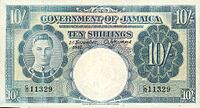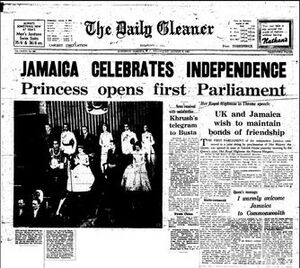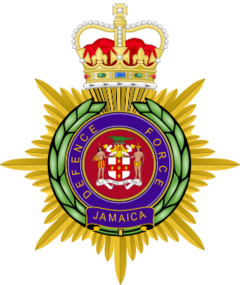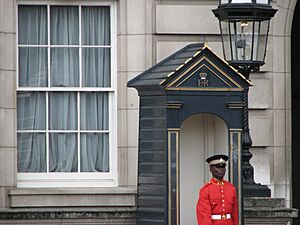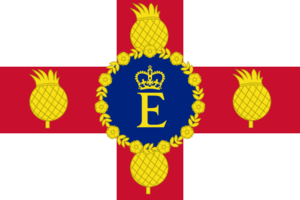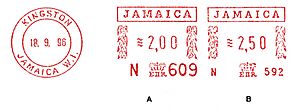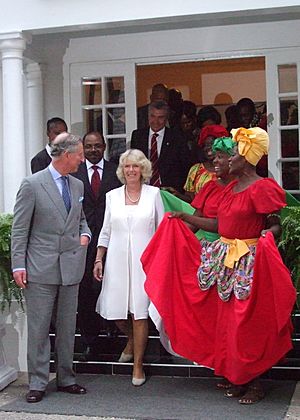Monarchy of Jamaica facts for kids
Quick facts for kids King of Jamaica |
|
|---|---|
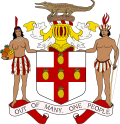
|
|
| Incumbent | |
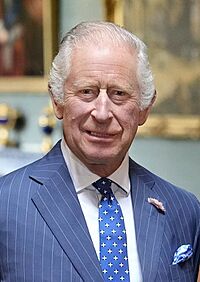 |
|
| Charles III since 8 September 2022 |
|
| Details | |
| Style | His Majesty |
| Heir apparent | William, Prince of Wales |
| First monarch | Elizabeth II |
| Formation | 6 August 1962 |
The monarchy of Jamaica is a system where a monarch (a king or queen) is the official head of state. This role is passed down through their family. Since September 8, 2022, King Charles III has been the King of Jamaica. He represents the "Jamaican Crown."
Even though King Charles III is also the monarch of 14 other independent countries in the Commonwealth of Nations, Jamaica's monarchy is separate. This means he is officially called the King of Jamaica. He and other members of the royal family do public and private duties for Jamaica. However, only the monarch has a role in Jamaica's laws.
The King holds all the main power in Jamaica's government. Laws passed by the Jamaican Parliament need his approval to become real. Most of these powers are used by elected members of parliament, government ministers, judges, and police. The King also has special powers, like dismissing a prime minister. These are called "reserve powers" and are important for keeping the government stable.
Today, the Crown helps make sure the government runs smoothly and fairly. It also protects against anyone abusing power. While the King has some special duties, most of his daily tasks are done by his representative in Jamaica, the Governor-General of Jamaica. Over time, the Jamaican Crown has developed its own unique symbols.
Since the 1970s, people in Jamaica have discussed changing from a monarchy to a republic. In a republic, the head of state is usually an elected president, not a monarch. The current Prime Minister, Andrew Holness, has said his government plans to hold a vote on this by 2025.
Contents
History of Jamaica's Monarchy
In 1655, a British group took control of Jamaica. They removed the Spanish, which took about five years. Spain officially gave Jamaica to Britain in 1670. In 1672, the Royal African Company was formed. This company had control over the British slave trade. From then on, Jamaica became a very busy place for selling enslaved people. Jamaica also became one of Britain's most valuable colonies because of its farms.
A small local government was set up in 1664 with the House of Assembly of Jamaica. But it only represented a few wealthy plantation owners. The British Parliament stopped the transatlantic slave trade in 1807. Later, in 1838, Parliament passed a law that freed all enslaved people in British colonies. In 1866, Jamaica became a "crown colony," meaning it was directly ruled by the British Crown. The new governor, Sir John Peter Grant, helped reorganize the colony. He created a police force, improved the justice system, and set up public services.
In 1944, a new constitution created a House of Representatives. Its members were chosen by all adults who could vote. After trying to join a West Indies Federation in 1958, Jamaica remained a self-governing colony of the United Kingdom. Then, in 1962, the Jamaica Independence Act 1962 was passed. This made Jamaica a fully independent country and a constitutional monarchy. Queen Elizabeth II became the head of state and Queen of Jamaica.
The Queen's sister, Princess Margaret, attended Jamaica's independence celebrations in August 1962. On August 7, she opened the first parliament of independent Jamaica for the Queen. The Queen also sent a message to Jamaicans. She welcomed the new country into the Commonwealth. She said Jamaica had shown how people from different backgrounds could live together. She believed Jamaica would help with cooperation and understanding around the world.
Why Jamaica Kept the Monarchy
Before Jamaica became independent in 1962, a special committee was formed to create a new constitution. Some people wanted Jamaica to become a republic, but the committee decided against it. Both main political leaders at the time, Alexander Bustamante and Norman Manley, wanted to keep the monarchy.
Alexander Bustamante's party, the Jamaica Labour Party, stated its loyalty to the monarchy in its rules. They wanted to teach people to respect God, the Queen, and lawful authority.
Norman Manley admired the British system of government. He explained that Jamaica's government should reflect its history with Britain. He strongly supported the "Westminster system" (the British way of governing). He believed the Queen should stay in the Constitution as a symbol of continuity. So, when Jamaica became independent, it chose to keep the monarchy as a key part of its government.
A law professor named Stephen Vasciannie suggested several reasons for this decision. These included a desire for stability, a wish to show Jamaica was ready for independence, the popularity of the British royal family among Jamaicans, and a liking for British culture among political leaders.
The Jamaican Crown and Its Role
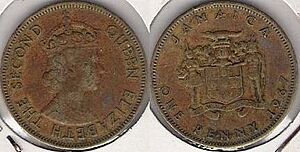
Jamaica is one of fifteen independent countries called Commonwealth realms. These countries share the same monarch. However, the monarch's role in Jamaica is completely separate from his role as monarch of any other country. Even though they share the same person as monarch, each Commonwealth realm, including Jamaica, is independent. The King of Jamaica is represented in the country by a viceroy, who is the Governor-General of Jamaica.
Since Jamaica's independence in 1962, the Crown has been both shared and separate. The King's role as monarch of Jamaica is different from his role as monarch of the United Kingdom or any other realm. This means the monarchy stopped being only a British institution. In Jamaica, it became a truly Jamaican institution.
This separation is shown in several ways. For example, the King has a special Jamaican title. When he acts as Jamaica's representative, he uses Jamaican symbols. These include the national flag and unique royal symbols. Also, only Jamaican government ministers can advise the King on matters related to Jamaica.
The King's Title
Soon after independence, Elizabeth II, at the request of Jamaica's Prime Minister, adopted a special title for her role as Queen of Jamaica. On August 18, 1962, her title for Jamaica became: Elizabeth the Second, by the Grace of God of Jamaica and of Her other Realms and Territories Queen, Head of the Commonwealth.
Since Charles III became King, his title is: Charles the Third, by the Grace of God of Jamaica and of His other Realms and Territories King, Head of the Commonwealth.
This title shows that Jamaica is an independent monarchy. It highlights the King's role specifically as the King of Jamaica. It also shows the shared connection with other Commonwealth realms. Usually, the King is called "King of Jamaica" when he is in Jamaica or doing duties for Jamaica abroad.
In the local language, Jamaican Patois, Queen Elizabeth II was known as Missis Queen and The Queen Lady.
How Succession Works

Like some other realms, Jamaica follows the United Kingdom's laws to decide who becomes the next monarch.
Succession is based on "absolute primogeniture." This means the oldest child, regardless of gender, inherits the throne. This is set by laws like the Succession to the Crown Act 2013, the Act of Settlement 1701, and the Bill of Rights 1689. These laws state that only natural, legitimate descendants of Sophia of Hanover can inherit the throne. They also say the monarch cannot be a Roman Catholic or married to one. The monarch must also be a member of the Church of England. Even though these laws for Jamaica are controlled by the British Parliament, neither the UK nor Jamaica can change the rules of succession without all the other realms agreeing. This is like a special agreement between these countries.
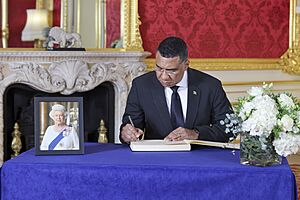
When a monarch dies or steps down, their heir immediately becomes the new monarch. There is no need for a special ceremony. A period of mourning follows, and flags across the country are flown at half-mast. Memorial services are held in all parts of Jamaica. The Governor-General usually announces the new monarch in Kingston.
The King as the State's Symbol
The King is seen as the symbol, or legal personality, of the Jamaican state. So, the state is called His Majesty in Right of Jamaica. This means the King owns all state lands (called Crown land), buildings, and equipment (called Crown property). He also owns the copyright for all government publications (called Crown copyright). Government officials, including the Governor-General, Prime Minister, judges, members of the Jamaica Defence Force, and police officers, work for the Crown.
Many officials used to have to swear loyalty to the monarch before starting their jobs. However, these oaths were changed in 2002 to remove mention of the monarch. Still, new Jamaican citizens must swear loyalty to the Jamaican monarch, his heirs, and successors. The current oath is:
"I, (name), do swear that I will be faithful and bear true allegiance to His Majesty King Charles the Third, His Heirs and Successors according to the Laws of Jamaica and that I will faithfully observe the laws of Jamaica and fulfil my duties as a citizen of Jamaica. So help me God."
The King's Role in Government
The Constitution of Jamaica gives the country a parliamentary system, similar to other Commonwealth realms. In this system, the King's and Governor-General's roles are legal and practical, but not political. The Crown is seen as a body where different parts share authority, with the King at the center. This means all state powers are legally held by the monarch. As head of state, the King is at the top of Jamaica's official order of importance.
The constitution says that most of the King's duties in Jamaica are carried out by the Governor-General. The Governor-General is appointed by the King based on the advice of the prime minister of Jamaica.
All government bodies act under the King's authority. The many powers belonging to the Jamaican Crown are known as the Royal Prerogative. Parliament's approval is not needed for the King to use these powers. Also, Parliament cannot even discuss a bill that affects the King's powers or interests without the Crown's permission.
The Executive Branch
One of the Crown's main duties is to appoint a prime minister. The prime minister then leads the Cabinet of Jamaica. The Cabinet advises the King or Governor-General on how to use their powers over all government and foreign affairs. The King's role is mostly symbolic. He represents the legal authority under which all governments operate. The Cabinet directs how the Royal Prerogative is used. This includes declaring war, keeping peace, and directing the Jamaica Defence Force. It also includes calling and ending parliamentary sessions and calling elections.
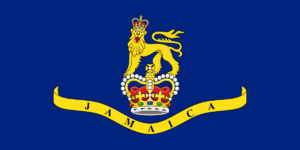
However, the Royal Prerogative belongs to the Crown, not to the ministers. The constitution allows the Governor-General to use these powers alone in special situations. These include dismissing a prime minister, dissolving parliament, or removing a judge during a constitutional crisis.
There are also a few duties that only the monarch performs, such as appointing the Governor-General.
To keep the government stable, the Governor-General appoints the person most likely to have the support of the House of Representatives of Jamaica as prime minister. The King is kept informed by his representative about the prime minister's resignation and the swearing-in of new ministers. He stays updated through regular messages from his Jamaican ministers. He also meets with them when possible. The Governor-General also appoints the leader of the Opposition, Cabinet members, privy councillors, senators, the Chief Justice, and other important officials.
Foreign Affairs
The King's special powers also extend to foreign affairs. The Governor-General approves treaties, alliances, and international agreements. Like other uses of the Royal Prerogative, no parliamentary approval is needed for this. However, a treaty cannot change Jamaica's local laws. An Act of Parliament is needed for that. The Governor-General, on behalf of the King, also approves Jamaican ambassadors and receives diplomats from other countries. Also, Jamaican passports are issued in the Governor-General's name, as the King's representative.
Parliament's Role
The King, along with the Senate of Jamaica and the House of Representatives, is one of the three parts of the Parliament of Jamaica. The Crown's authority is shown in the mace of the Parliament, which has a crown at its top.
However, the King does not take part in making laws. The Governor-General does, but only by giving Royal Assent (approval). The constitution also says that only the Governor-General appoints senators. The Governor-General appoints thirteen senators based on the prime minister's advice. He appoints eight others based on the leader of the opposition's advice. The Governor-General also calls, ends, and dissolves parliament. After parliament is dissolved, the Governor-General issues the orders for a general election from King's House, Jamaica.
A new parliamentary session begins with the Ceremonial Opening of Parliament. During this, the monarch or the Governor-General reads the Speech from the Throne.
All laws in Jamaica become official only when the Governor-General gives Royal Assent in the King's name. This approval is needed for all acts of parliament. It is usually given by the Governor-General, using the Broad Seal of Jamaica.
Until 2024, Jamaican bills started with the phrase: "Be it enacted by The King's [or Queen's] Most Excellent Majesty, by and with the advice and consent of the Senate and House of Representatives of Jamaica, and by the authority of the same, as follows". The reference to the monarch was removed from this phrase by a law passed in 2024.
Courts and Justice
The King is responsible for providing justice for all his people. He is traditionally seen as the fount of justice (the source of justice). In Jamaica, crimes are legally seen as offenses against the King. Lawsuits for serious crimes are brought in the King's name, for example, The King [or Queen] versus [Name]. This means the King cannot be charged with crimes in his own courts.
All judges of the Supreme Court of Jamaica are appointed by the Governor-General. The highest court for appeals in Jamaica is the Judicial Committee of the King's Privy Council.
The Governor-General, on behalf of the Jamaican monarch, can also grant protection from prosecution. He can use the royal prerogative of mercy to pardon crimes against the Crown. This can happen before, during, or after a trial. The power to grant pardons and reduce prison sentences is described in section 90 of the Constitution.
Cultural Role of the Monarchy
Honours and Awards

In the Commonwealth realms, the monarch is seen as the fount of honour (the source of all honours). The King or the Governor-General gives awards and honours in Jamaica. They do this based on the advice of Jamaican ministers.
In 1969, Jamaica created six national orders of honour. The Governor-General is the head of the Order of National Hero. He is in charge of managing this order. Every year on the third Monday of October, Jamaica celebrates National Heroes Day. On this day, the Governor-General holds ceremonies at King's House. He presents national honours and awards to deserving Jamaicans.
When the monarch celebrates a special anniversary, like a jubilee, Jamaica awards special medals. These are given to people in Jamaica's essential services. Special Jubilee medals were given in 2012 for the Queen's Diamond Jubilee and in 2022 for the Queen's Platinum Jubilee.
The Crown and the Defence Force
The Crown is at the very top of the Jamaica Defence Force (JDF). This is shown in Jamaican naval ships, which have the letters HMJS before their names. This stands for His Majesty's Jamaica Ship.
St Edward's Crown appears on the Jamaica Defence Force badges. This shows that the monarchy is the source of authority.
The power to give official ranks in the Jamaica Defence Force belongs to the monarch. This power is used by the Governor-General on the monarch's behalf.
The Crown's connection with the Jamaica Defence Force has been shown in many ways. These include giving medals like the Queen's Medal for Champion Shots to JDF members. The Governor-General also presents special flags to the Jamaica Regiment for the monarch. JDF members have also taken part in royal events in the United Kingdom. Members of the royal family have also participated in military ceremonies in Jamaica.
In 1999, Jamaica became the first Caribbean realm to provide soldiers for the Queen's Guard. Troops from the Jamaica Regiment stood guard at Buckingham Palace. In 2007, soldiers from the Jamaican Regiment again mounted the Queen's Guard at Buckingham Palace and Windsor Castle. The commanding officer, then-Lieutenant Colonel Derek Robinson, said that mounting the Queen's Guard "symbolizes one of the highest tributes" Jamaicans can pay to the monarch.
The Crown and the Police Force
Every member of the Jamaica Constabulary Force must swear loyalty to the Jamaican monarch when they join. Under the Constabulary Force Act, every police officer must take this oath:
"I, (name), do swear that I will well and truly serve Our Sovereign Lord the King, in the office of _____, without favour or affection, malice or ill-will and that I will see and cause His Majesty's Peace to be kept and preserved; and that I will prevent, to the utmost of my power, all offences against the same; and that while I shall continue to hold the said office I will, to the best of my skill and knowledge, discharge all the duties thereof faithfully, according to law. So help me God."
St Edward's Crown is used on the badge of the Jamaica Constabulary Force. It is also part of the rank symbols for commissioner, senior superintendent, and superintendent.
Jamaican Royal Symbols
Since Queen Elizabeth II's reign began, royal symbols in Jamaica have been changed to be distinctly Jamaican. New ones have also been created, like the Queen's Personal Jamaican Flag in 1966. The Governor-General's personal flag is second in importance.
Queen Elizabeth II's personal flag for her role as Queen of Jamaica was first used during her visit to Jamaica in 1966. The flag shows the Coat of Arms of Jamaica with the Queen's royal cypher (her special symbol). The flag is white with a red St George's Cross. A gold pineapple is on each arm of the Cross. A blue circle with the Royal Cypher is in the center of the Cross. This circle comes from the Queen's Personal Flag.
A crown is used to show that the monarchy is the source of authority. It appears on various badges and rank symbols.
As the symbol of the state, the monarch owns special Jamaican jewelry. An example is the Jamaican Hummingbird brooch. This brooch was given to Queen Elizabeth II during her Golden Jubilee visit in 2002. The Duchess of Cambridge also wore this brooch during her visit to Jamaica in 2022.
Royal Visits to Jamaica
Queen Elizabeth II's first visit to Jamaica was in November 1953.
At Jamaica's independence celebrations in 1962, the Queen's sister, Princess Margaret, represented her. Princess Margaret opened the first session of the Parliament of Jamaica for the Queen.
The Queen visited Jamaica again in March 1966. That same year, Prince Philip, Duke of Edinburgh, with his son, Prince Charles, opened the 1966 British Empire and Commonwealth Games in Kingston. Other visits by the Queen happened in April 1975, February 1983, March 1994, and February 2002. Before her 2002 visit, the BBC reported that she received a warm welcome, even though some people in the country wanted a republic. A poll that year showed 57 percent of people thought the Queen's visit, as part of her Golden Jubilee, was important. A Jamaican polling group said at the time that social scientists were often surprised by how much Jamaicans liked Queen Elizabeth II.
King Charles III's most recent visit, when he was Prince of Wales, was in 2008. During this visit, he went to Rose Town. There, his foundation, The Prince's Foundation for the Built Environment, helped improve the area. The foundation started working with residents in 2004, after Charles's visit in 2001. In 2008, the foundation promised to raise about US$4 million for development projects in Rose Town. In 2010, the Rose Town Foundation was created to work closely with the Prince's Foundation on these plans.
Becoming a Republic
Since the 1970s, people in both of Jamaica's main political parties have supported making Jamaica a republic. In 1975, the government led by Michael Manley set up a committee to look into changing the constitution. In July 1977, they announced that Jamaica would become a republic by 1981. However, Manley's party lost the 1980 Jamaican general election to the Jamaica Labour Party (JLP), led by Edward Seaga. Seaga had said in 1977 that he preferred a "ceremonial presidency." But no real steps were taken to become a republic during his time as prime minister.
In September 2003, then-Prime Minister of Jamaica P. J. Patterson called for Jamaica to get rid of the monarchy by 2007. Bruce Golding, who was prime minister and leader of the Jamaica Labour Party, also promised that Jamaica would "take steps to amend the constitution to replace the Queen with a Jamaican president." He said this president would symbolize the nation's unity.
Prime Minister Portia Simpson-Miller wanted to convince parliament to make Jamaica a republic by the country's 50th anniversary of independence in August 2012. But she did not get the needed support from two-thirds of both houses of parliament. Her party had enough votes in the House of Representatives, but they were one seat short in the Senate. They would have needed support from at least one senator from the opposition Jamaica Labour Party. The current leader of the JLP, Andrew Holness, who became prime minister in 2016, announced that the government would change the constitution. This change would "replace Her Majesty the Queen with a non-executive president as head of state."
During the 2020 Jamaican general election, the opposition People's National Party promised to hold a vote on becoming a republic within 18 months if they won. A poll showed that 55 percent of people supported the idea of the country becoming a republic. However, the ruling Jamaica Labour Party won the election. Two years later, in June, the government announced that Jamaica would become a republic by the time of the next election in 2025.
List of Jamaican Monarchs
| Portrait | Regnal name (Birth–Death) |
Reign over Jamaica | Full name | Consort | House | |
|---|---|---|---|---|---|---|
| Start | End | |||||
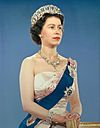 |
Elizabeth II (1926–2022) |
6 August 1962 | 8 September 2022 | Elizabeth Alexandra Mary | Philip Mountbatten | Windsor |
| Governors-general: Sir Kenneth Blackburne, Sir Clifford Campbell, Sir Herbert Duffus (acting), Sir Florizel Glasspole, Edward Zacca (acting), Sir Howard Cooke, Sir Kenneth O. Hall, Sir Patrick Allen Prime ministers: Sir Alexander Bustamante, Sir Donald Sangster, Hugh Shearer, Michael Manley, Edward Seaga, P. J. Patterson, Portia Simpson-Miller, Bruce Golding, Andrew Holness |
||||||
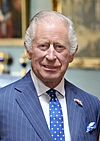 |
Charles III (born 1948) |
8 September 2022 | present | Charles Philip Arthur George | Camilla Shand | Windsor |
| Governors-general: Sir Patrick Allen Prime ministers: Andrew Holness |
||||||
See also
- Constitution of Jamaica
- Privy Council of Jamaica
- Lists of office-holders
- List of prime ministers of Elizabeth II
- List of prime ministers of Charles III
- List of Commonwealth visits made by Elizabeth II
- Monarchies in the Americas
- List of monarchies
 | Janet Taylor Pickett |
 | Synthia Saint James |
 | Howardena Pindell |
 | Faith Ringgold |


